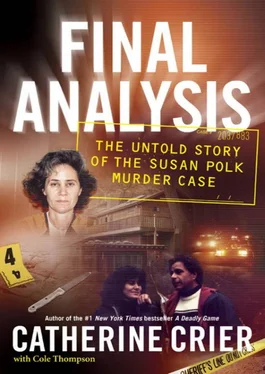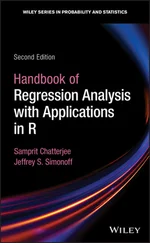I asked Susan if she’d ever raised the issue with Felix.
“I brought it up, and he looked nervous,” she said.
Susan’s recollections of her early sessions with Dr. Polk seemed fuzzy at best; her words often became twisted when I asked her to clarify the abuse she allegedly suffered as a patient, and she failed to answer my question as to whether there was physical evidence to confirm her fears. After all, if she were a virgin when she first went to see Felix, then she would have most likely noticed some blood in her undergarments that first time.
“I recall the content of some of those hypnotic sessions, bits and pieces,” Susan answered in a soft voice. “And I recall being told not to look.
“I guess at that time I didn’t really think it was great that he basically had sex with me. And put me down…it just made me, you know, I was doing what I was told, but he was so overwhelming. So just, physical. It was just awful. And I really didn’t remember that for years.”
Susan claimed that she completely blocked out the sessions in which she was “raped” by Felix until she was in her forties. She described their sexual relationship as husband and wife as “unpleasant” and alluded to years of “rough” sex during their marriage. She said Felix enjoyed physically restraining her during intercourse, even as she lay crying.
“So what happened?” I asked.
“He essentially, what he told me was that if I ever left him he would kill himself, or he would kill me.”
“So even when you were seventeen he was telling you this?”
Susan could not really answer my question. In many ways, her responses were childlike, and she appeared at times to be no more than a teenage girl trapped in a woman’s body.
“Felix wanted someone to dominate,” Susan maintained. “He wanted a doll. There was no individuality left, there was none of me.”
From all the evidence that I had seen and what she told me in this conversation, I had little doubt that Susan was abused during the marriage, at least emotionally. Felix had misused his power and position as a therapist to wield control over his vulnerable patient. His selfish decision to begin a relationship with the teen had probably prevented Susan from getting the help she so desperately needed.
“My husband was a professional,” Susan explained. “He was, I think, careful about what he did.…I think it is hard for someone who hasn’t been in a coercive relationship to understand how it is that a person stays in it.
“Because I kept hoping that it wasn’t as bad as I thought. That he wasn’t really as crazy as maybe he seemed to be. That when he said, ‘I’ll kill you’ with a smile, he didn’t really mean it. And that’s a huge hurdle to overcome…explaining to the jury that even though he didn’t beat me with a crowbar, it was enough to scare me to death, that I was afraid for my life, but I was also afraid to leave.”
Going on to explain how she managed the finances for both the family and Felix’s practice, Susan brought up Felix’s questionable relationships. She tried to ignore her husband’s inappropriate friendships with female patients over the years, but she detailed one incident specifically. “I just chose to interpret them as not affairs, but as just friendships…. But, in time, I guess the veil kind of fell from my eyes around when I turned forty, which is kind of a seminal period in a woman’s life, anyway, right?
“It’s like all of a sudden I’m like, ‘Whoa, this is what’s really going on, you know, I really actually turned forty and I said to myself, ‘Now, I should be prepared to face reality.’” Susan laughed aloud. “I just started to not lie to myself about certain things, including the relationship with one of his clients, another psychologist,” Susan said in reference to the woman whom Susan had seen her husband romantically embrace five years before his death.
Talking to her about Felix’s alleged indiscretions, I couldn’t help but wonder if this could have been the motive when she killed him. Whether or not Felix actually did cheat, it was clear that he had maintained relationships with some of his patients that were eerily reminiscent of his inappropriate relationship with Susan. In Susan’s situation, a revelation of infidelity might have pushed her over the edge, as this replayed her father’s betrayal of her mother. This possible motive deserved some serious attention, as adultery touched at the very root of Susan’s psychological issues.
Susan claimed that once she announced her intention to leave the marriage, Felix made all sorts of threats.
“‘I’ll drive you crazy.’ ‘I’ll kill you if you leave me.’ ‘I’ll destroy you.’ ‘I’ll throttle you.’ ‘Pull you down the drain.’ ‘You’ll wind up in an institution.’ ‘You are a bad mother.’ ‘You are so ugly.’…
“I think he was very crazy, a little more than I realized…. He was very, very split, you know, it was like night and day, Dr. Jekyll and Mr. Hyde. There were two sides to his personality. And he was extremely impulsive and malicious….
“It takes a certain kind of person to kill somebody’s dogs or to threaten their children… he would sabotage their progress in school. He was just a very dangerous, damaged person.”
Chapter Twenty-two
A MACABRE TWIST
Dressed conservatively in a gray suit, her short hair overgrown and brushed off her face, Susan unceremoniously entered the courtroom of the Contra Costa County Courthouse on October 11, 2005, for the opening remarks in her murder trial.
Onlookers watched from the gallery as Susan slid into a chair at the defense table between her lawyers, Dan Horowitz and Ivan Golde. Next to the tanned Horowitz, she looked pale and fragile, having lost a considerable amount of weight since her incarceration.
In the days leading up to the trial, her lawyers publicly proclaimed they would prove Susan acted in self-defense when she stabbed Felix in the guest cottage on October 13, 2002. They asserted that responding officers contaminated the crime scene that night by moving the body from its original position on the floor of the living room.
Pointing to police crime scene photos, Horowitz claimed that documented blood smears around the body and on the floor nearby indicated that Felix had been turned over by investigators, thus destroying potential evidence of Susan’s innocence.
Superior Court Judge Laurel Brady had replaced Judge Mary Ann O’Malley on the bench after Susan complained bitterly of O’Malley’s bias. Judge Brady, a square-shouldered woman with graying hair and a conservative manner, had been appointed to the bench in 1996 by then-Governor Pete Wilson. Susan was unhappy with her assignment as well. Brady had served as a prosecutor with both the Contra Costa and Solano County District Attorneys Offices, and had presided over numerous murder trials. She was married to Larry Brady, a longtime member of the Richmond Police Department who had recently retired after twenty-six years on the job. Using her preemptory challenge, Susan had asked that Judge Brady also recuse herself, but the court denied her request, ruling that Susan had filed it too late.
The trial had already been delayed two times by Judge Brady, who cited her “extensive calendar” as the reason for the postponements. In addition, Susan’s constant bickering with the judge, when she was acting as her own attorney, had nearly doubled the length of the hearings. Prosecutor Tom O’Connor had exhibited great restraint, despite the repeated delays. During his eleven years with the district attorney’s office, O’Connor had won several convictions on charges of first-degree murder and he appeared confident he would secure another in the Polk case.
Читать дальше











